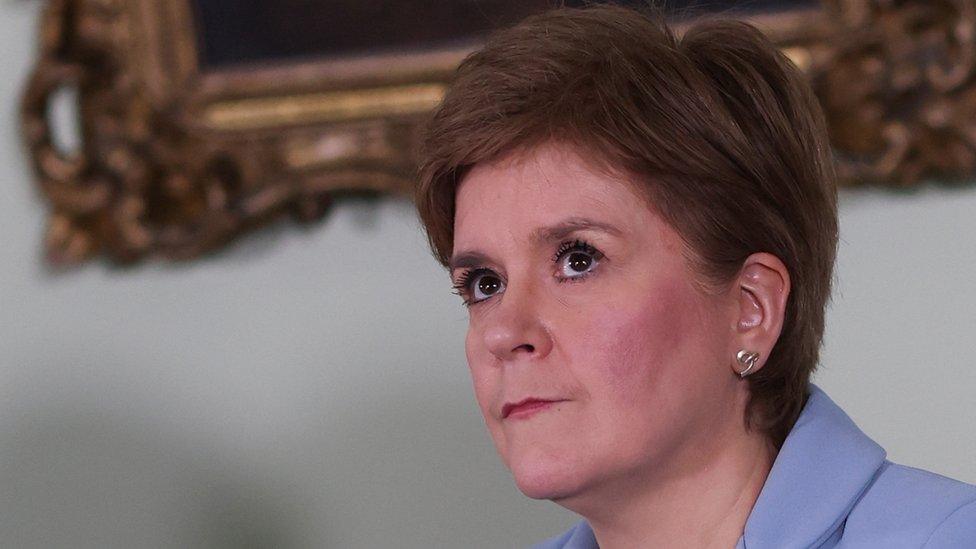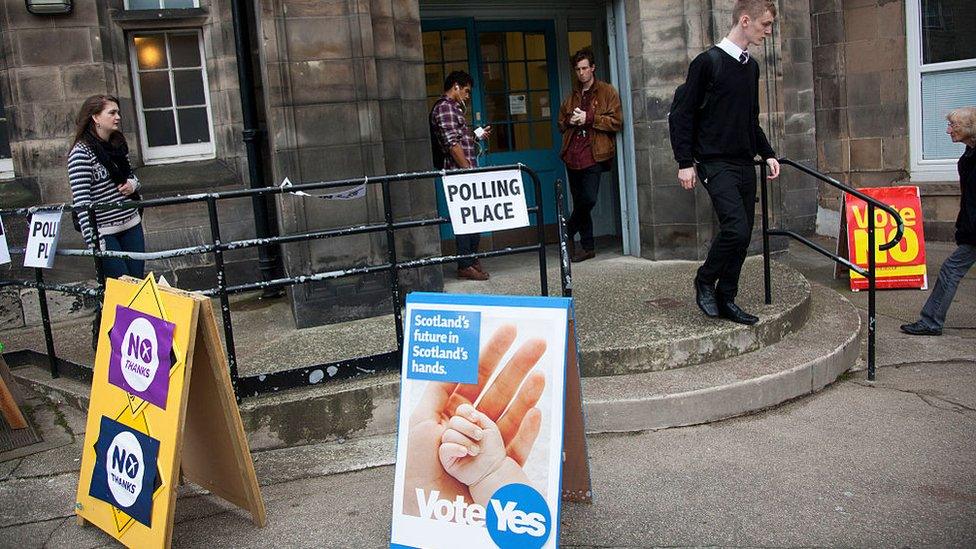Sturgeon to set out indyref2 'route map' next week
- Published

Ms Sturgeon had promised to give a "significant" update before Holyrood breaks up for the summer
Nicola Sturgeon is to set out details next week of how she plans to hold a second referendum on Scottish independence.
The first minister will make a statement in the Scottish Parliament on Tuesday 28 June.
She is expected to say how she intends to hold a referendum in October of next year, regardless of whether or not the UK government grants formal consent.
The UK government has already indicated it will not do so.
Ms Sturgeon will take questions from MSPs after giving her statement, which will come just two days before Holyrood goes into recess for the summer holidays.
The first minister said last week that she would soon give a "significant update" on how a "lawful" referendum could be held without the UK government agreeing to what is known as a Section 30 order.
This was put in place ahead of the last referendum in 2014, but the UK government has repeatedly said that "now is not the time" for another vote on independence and has indicated it will not agree to another Section 30 any time soon.
Ms Sturgeon said last week that she would soon make a "significant" announcement on what she will do if this stance does not change.
She said this plan would show how the Scottish government intends to "forge a way forward, if necessary without a section 30 order".
However, she stressed that this must be done "in a lawful manner" - which has led to speculation that she could be preparing for a "consultative" referendum on independence.
This could see proposals for people to be asked a different question to the straight yes/no question on whether Scotland should become an independent country that they were asked in the 2014 referendum.
For example, voters could instead be asked of they believe the Scottish government should begin negotiations with the UK government on Scotland leaving the UK.
Some commentators believe this is less likely to be successfully blocked by the UK government through the courts.
Ms Sturgeon has previously admitted that there would be "challenges to work through if we are to have what I think is essential to deliver independence - a lawful process".
There have also been suggestions that the pro-UK parties could boycott any referendum that was held without the consent of the UK government - which could potentially refuse to recognise the result.

There has been speculation that Ms Sturgeon could propose asking voters a different question to the one they were asked in 2014
The Scottish government's constitution secretary, Angus Robertson, refused to comment at the weekend on speculation about the first minister's plans, beyond saying that she would set out a route map to a second referendum.
Ms Sturgeon has not yet formally requested a Section 30 order from the UK government, and would need to pass legislation for a referendum in the Scottish Parliament - which she would be able to do with the support of the pro-independence Scottish Greens.
But she did publish the first in a series of papers last week which are aimed at making a fresh case for independence.
Scottish Conservative constitution spokesman Donald Cameron said people in Scotland were "sick and tired of the SNP's obsession with independence".
He added: "In the last week before summer recess, people want to hear their MSPs discussing the issues that really matter to them - not yet another speech on independence from Nicola Sturgeon.
"With the cost of living spiralling, Scotland's NHS facing an unprecedented crisis, and our economy still struggling to recover from the pandemic, this debate is an unjustifiable waste of time.
"Once again, Nicola Sturgeon has blatantly ignored Scotland's real priorities to promote an unwanted second referendum."
According to polling expert Prof Sir John Curtice, the last half dozen polls have - on average - put support for independence at 48%, with 52% against, once "don't know" votes are excluded.